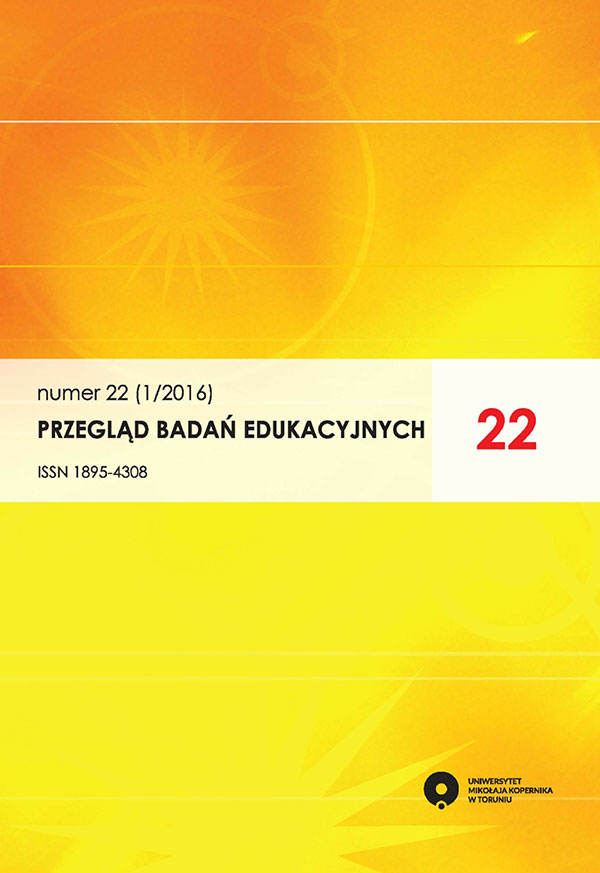The Issue of Social Inclusion and Exclusion in the Scientific Community of Pedagogues and the Measuring Phenomena Proposal
DOI:
https://doi.org/10.12775/PBE.2015.069Keywords
Inclusion, exclusion, scientific community, measurement, visual analogue scaleAbstract
An investigation of social affiliation among researchers is particularly promising in the case of pedagogy. This is facilitated by its interdisciplinary nature, diversity in terms of theoretical perspectives and research areas. This makes it a convenient laboratory to allow observation of social processes of inclusion and exclusion in the research community focused on the education. The application of self-categorization theory provides an opportunity to perceive the factors determining the formation and maintenance of environmental factions and individual involvement of individual representatives. Thus, the theory creates a convenient perspective of inclusion and exlusion measurement in the social environment of science, especially using solutions based on the idea of distance like a visual scale.References
Aron A., Aron E. N., Smollan D. (1992), Inclusion of Other in the Self Scale and the Structure of Interpersonal Closeness, “Journal of Personality and Social Psychology”, 63 (4), s. 596−612.
Bourdieu P. (1984), Specyfika dziedziny naukowej i społeczne warunki rozwoju wiedzy, w: E. Mokrzycki (red.), Kryzys i schizma. Antyscjentystyczne tendencje w socjologii współczesnej, Państwowy Instytut Wydawniczy, Warszawa, s. 87−136.
Chojnicki Z., Czyż T. (1997), Regionalny układ nauki w Polsce i jego zmiany, w: Z. Chojnicki, T. Czyż (red.), Struktura przestrzenna nauki w Polsce, Bogucki Wydawnictwo Naukowe, Poznań, s. 45−107.
Fila-Jankowska A., Jankowski K. (2008), Parametry psychometryczne metody symulowanego dążenia – unikania (SDU), „Psychologia Społeczna”, 2 (7), s. 109−123.
Fleck L. (1986), Powstanie i rozwój faktu naukowego. Wprowadzenie do nauki o stylu myślowym i kolektywie myślowym, Wydawnictwo Lubelskie, Lublin.
Forgas J. P., Williams K. D., Wheeler L. (2005), Umysł społeczny – wprowadzenie, w: J. P. Forgas, K. D. Williams, L. Wheeler (red.), Umysł społeczny, Gdańskie Wydawnictwo Psychologiczne, Gdańsk, s. 21−41.
Funke F., Reips U. D. (2012), Why Semantic Differentials in Web-Based Research Should be Made From Visual Analogue Scales and Not From 5-Point Scales, “Field Methods”, 24 (3), s. 310−327.
Guba E. G., Lincoln Y. S. (2005), Paradigmatic controversies, contradictions, and emerging confluences, w: N. K. Denzin, Y. S. Lincoln (eds.), The Sage handbook of qualitative research, CA, Sage, Thousand Oaks, s. 191−215.
Hogg A. M. (2000), Social Identity and Social Comparison, w: J. Suls, L. Wheeler (eds.), Handbook of Social Comparison. Theory and Research, Springer Science + Business Media, LLC, New York.
Hogg A. M. (2005), Autokategoryzacja i usuwanie subiektywnej niepewności – poznawcze
i motywacyjne aspekty tożsamości społecznej i przynalezności grupowej, w: J. P. Forgas, K. D. Williams, L. Wheeler (eds.), Umysł społeczny, tłum. A. Nowak, Gdańskie Wydawnictwo Psychologiczne, Gdańsk, s. 326−349.
Korab K. (red.) (2011), Pseudonauka. Choroba, magia czy biznes?, Wydawnictwo Scholar, Warszawa.
Kubinowski D. (2010), Metodologia spod znaku chi2 a humanistyczna tożsamość pedagogiki, w: J. Piekarski, D. Urbaniak-Zająć, K. J. Szmidt (red.), Metodologiczne problemy tworzenia wiedzy w pedagogice. Oblicza akademickiej praktyki, Wydawnictwo Impuls, Kraków, s. 79−89.
Kubinowski D., Nowak M. (2006), Metodologia pedagogiki zorientowanej humanistycznie, Wydawnictwo Impuls, Kraków.
Kuhn S. (2001), Struktura rewolucji naukowych, tłum. H. Ostromęcka, J. Nowotniak, Fundacja Aletheia, Warszawa.
Lakatos I. (1995), Pisma z filozofii nauk empirycznych, Wydawnictwo Naukowe PWN, Warszawa.
Leydesdorff L., Persson O. (2010), Mapping the Geography of Science: Distribution Patterns and Networks of Relations among Cities and Institutes, “Journal of the American Society for Information Science & Technology”, 61 (8), s. 1622−1634.
Longino H. E. (1990), Science as Social Knowledge: Values and Objectivity in Scientific Inquiry, Princeton University Press, Princeton.
Mashek D., Cannaday L. W., Tangney J. P. (2007), Inclusion of Community in Self Scale: a Single-Item Pictorial Measure of Community Connectedness, “Journal of Community Psychology”, 32 (2), s. 257−275.
Morawski P. (2004), The Scientific Dimensions of Society and their Distant Echoes in American Philosophy of Science, “Studies in the History and Philosophy of Science. Part A”, (35), s. 283−326.
Moskowitz G. B. (2009), Zrozumieć siebie i innych. Psychologia poznania społecznego, Gdańskie Wydawnictwo Psychologiczne, Gdańsk.
Palka S. (2008), Dziedzina i pogranica poznania naukowego oraz badań w pedagogice, w: K. Rubacha (red.), Konceptualizacje przedmiotu badań pedagogiki, Wydawnictwo Impuls, Kraków, s. 173−183.
Pasikowski S. (2014a), Transparency of research published in the leading polish educational journals, w: A. L. L. Gómez Chova (ed.), Proceedings, IATED Academy INTED 2014, Valencia, s. 4152−4159.
Pasikowski S. (2014b), Kultura metodologiczna i raportowanie badań empirycznych publikowanych w wiodących czasopismach poświęconych zagadnieniom edukacji, „Kultura i Edukacja”, 2, s.103−133.
Popper K. R. (1999), Droga do wiedzy: Domysły i refutacje, Wydawnictwo Naukowe PWN, Warszawa.
Reips U. D., Funke F. (2008), Interval-level measurement with visual analogue scales in Internet-based research: VAS Generator, “Behavior Research Methods”, 40 (3), s. 699−704.
Schubert T. W., Otten S. (2002), Overlap of Self, Ingroup, andOutgroup: Pictorial Measures of Self-Categorization, “Self and Identity”, 1, s. 353−376.
Sedikides C., Gaertner L. (2005), Ja społeczne – poszukiwanie tożsmości a prymat motywacyjny Ja indywidualnego, w: J. P. Forgas, K. D. Williams (eds.), Umysł społeczny, Gdańskie Wydawnictwo Psychologiczne, Gdańsk, s. 130−151.
Tajfel H., Turner J. C. (1979), An Integrative Theory of Intergroup Conflict, w: W. G. Austin, S. Worchel (eds.), The Social Psychology of Intergroup Relations, Brooks-Cole, Monterey, CA, s. 33−47.
Turner J. C., Oakes P. J. (1986), The significance of the social identity concept for social psychology withreference to individualism, interactionism and social influence, “British Journal of Social Psychology”, 25, s. 231−252.
Urbaniak-Zając D. (2013), Jakościowa orientacja w badaniach pedagogicznych, w: D. Urbaniak-Zając, E. Kos (red.), Badania jakościowe w pedagogice, Wydawnictwo Naukowe PWN, Warszawa, s. 19−90.
Wojciszke B. (2011), Psychologia społeczna, Wydawnictwo Scholar, Warszawa.
Downloads
Published
How to Cite
Issue
Section
Stats
Number of views and downloads: 2230
Number of citations: 0



